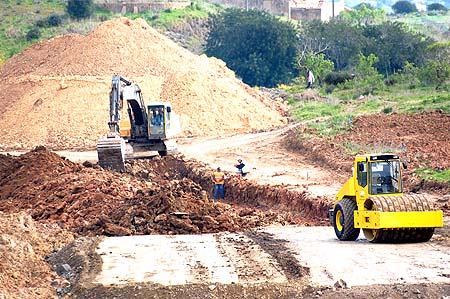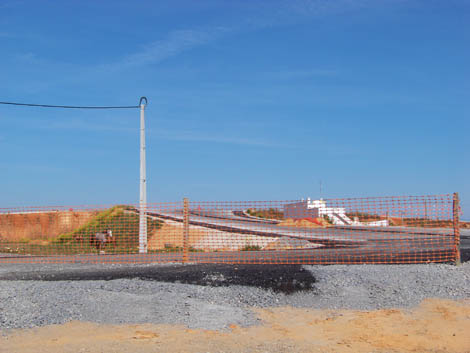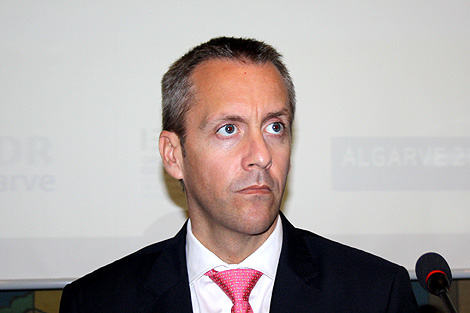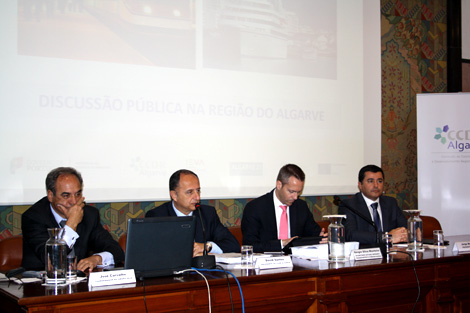 If the Algarve wants the EN 125 to be upgraded, this will also be the Government's priority. But the region will have to be aware that, in this way, there may not be money to invest in the electrification of the Algarve Railway.
If the Algarve wants the EN 125 to be upgraded, this will also be the Government's priority. But the region will have to be aware that, in this way, there may not be money to invest in the electrification of the Algarve Railway.
The warning was left by the Secretary of State for Infrastructure, Transport and Communications Sérgio Monteiro at a public discussion session on the report of the Working Group for Added Value Infrastructure (IEVA), which took place this Friday, in Faro.
The meeting was attended by some of those responsible for the work, who identified 30 priority public works projects that contribute to stimulating the economy, who explained their methodology and the way in which the projects were chosen. In the Algarve, two priority interventions were identified: completion of the electrification of the railway line in its entirety and alteration of the route to approach the airport of Faro (55 million euros) and interventions in the commercial ports of Portimão and Faro to improve accessibility and allow them to receive ships with larger drafts (10 million euros).
 Although the need for these two works has never been questioned, particularly the investment in Ports, in the "very high" discussion that followed the presentation of the representatives of the IEVA group, it was clear that the greatest concern of the living forces of the Algarve is the road that connects Vila Real de Santo António to Vila do Bispo.
Although the need for these two works has never been questioned, particularly the investment in Ports, in the "very high" discussion that followed the presentation of the representatives of the IEVA group, it was clear that the greatest concern of the living forces of the Algarve is the road that connects Vila Real de Santo António to Vila do Bispo.
This was the message conveyed by the vast majority of participants in the debate, from mayors to businessmen in the region. AMAL president Jorge Botelho (PS), the mayor of Faro Rogério Bacalhau (PSD) and the president of the business association NERA Vítor Neto were some of the interveners, all with a speech to that effect.
«An Englishman who arrives here in the region can say: the Algarve is fantastic, but you can't go anywhere! You get stuck on the EN 125 and on the A22 you don't know how much or how you pay”, illustrated Vítor Neto.
The businessman and association leader defended that it is necessary to create conditions for mobility in the region, starting by finishing the redevelopment of the EN 125, “so that tourists can spend as much as possible”. Vítor Neto also defended a reduction in the price of tolls, considering that this could bring more traffic to Via do Infante and, therefore, more revenue for the State.
 Rogério Bacalhau, on the other hand, demanded that the situation of the North bypass to the Algarve capital be quickly unlocked, arguing that if «the concessionaire does not have the capacity, the work should be rescued»
Rogério Bacalhau, on the other hand, demanded that the situation of the North bypass to the Algarve capital be quickly unlocked, arguing that if «the concessionaire does not have the capacity, the work should be rescued»
Sérgio Monteiro guaranteed to have heard these concerns if they will be taken into account at the time of the decision. “I recognize that the state of the EN 125 is not acceptable for a tourist region like the Algarve and for a country like Portugal”, he admitted.
Even so, he warned, if “the EN 125 is finished faster, there will be no money for the Railway”.
On the sidelines of the session, the secretary of state explained to journalists that the choice could become inevitable due to the scarcity of funds. «If the work does not advance in the concession model, the State will rescue the work (see box below) and will seek to create financial conditions in Estradas de Portugal for it to advance».
As there are no community funds for roads between 2014 and 2020, as Portugal has, on average, many kilometers of road per inhabitant, this investment will have to be ensured by national funds.
“In the case of the Railway, there may be a contribution from community funds, but there is a part, at least 15 percent, that has to come from REFER's budget. (…) Either we are going to get a bit of money from the Estradas de Portugal Budget, or the same money has to be applied as a national counterpart for the railways», he explained.
In other words, either the work progresses “faster” with the renegotiation of the contract with Rotas do Algarve coast, or, “if we have to rescue the concession, we will have to make that choice: either the Algarve Line is modernized, or we keep the money on Estradas de Portugal».
As for the investment in the Ports of Portimão and Faro, its priority is not in question. Even so, given the warnings from the assistance that the budget of 10 million could be too short to carry out the planned interventions (expansion of the maneuver basin in Portimão and desilting of the mouth of the Arade and of the access channel to the Port of Faro), those responsible for the report announced that they will ask the National Civil Engineering Laboratory to carry out a new cost assessment.
Government admits to rescue works on EN 125
 Finishing the EN 125 “faster” can still mean many things. Although negotiations are still underway with concessionaires and dialogue is the path that will be favored by the Government and Estradas de Portugal for the time being, the possibility of terminating the contract and rescuing the work to the public sphere is not ruled out.
Finishing the EN 125 “faster” can still mean many things. Although negotiations are still underway with concessionaires and dialogue is the path that will be favored by the Government and Estradas de Portugal for the time being, the possibility of terminating the contract and rescuing the work to the public sphere is not ruled out.
One of the few priority road works identified in the IEVA report, the Marão Tunnel, was granted a concession, but the State rescued it, something that «has not happened for over a hundred years in Portugal and has never been done in Europe». Sérgio Monteiro does not reject the possibility of doing the same with the EN 125.
This second possibility will, even so, motivate the restart of the process of awarding the work, which will only be done "when the financing is guaranteed". “The Marão tunnel work was rescued in June 2103 and the work was launched today, February 28, 2014”, he recalled.
The president of Estradas de Portugal António Ramalho, after criticism from various sectors for the lack of completion of works on the EN 125 on the list of priority works, reviewed the situation.
«I'm in an easy position, because, in the Algarve, I don't have time [for the presentation of investments], nor money, nor roads», he joked, as soon as he took the floor. I was wrong. The infrastructures that Estradas de Portugal does not have in the Algarve, as they are currently under concession to private companies, were the main focus of the discussion.
In view of the criticisms and interventions calling for the completion of the work, whose “elevation” the members of the Working Group praised, António Ramalho made a detailed assessment of the EN 125 process.
According to the president of Estradas de Portugal, the renegotiation process with the Rotas do Algarve Litoral consortium, which won the concession, is still underway, a process that he considers to have been “inquired” from the start by the concession's rules.
In summary, the agreement made by the previous PS government and the consortium of Spanish and Portuguese companies (which ended up stopping the work due to financing difficulties) determined that Estradas de Portugal would “pay twice as much for the requalification of the EN 125 as it paid for the A22'.
At issue is the agreed financing model, in which the State “paid for each car that passed on the EN 125, via the State Budget and would fetch money from the tolls on Via do Infante”, to try to compensate. This, when toll collection caused a lot of traffic to escape to the EN 125.
An agreement that the current Government is renegotiating and that involves the reduction of the costs of the work, namely the drop of some of the planned variants and the concentration on what is already in progress, namely the Variants of Faro, Troto, Guia and Lagos.
“If the negotiations are not more advanced, it is because there has been difficulty in reaching an agreement with our interlocutors”, revealed António Ramalho. The president of Estradas de Portugal defended that dialogue is, for now, the way to ensure that the work will be completed more quickly, not least because the intervention, once it is restarted, "will take about 3 months" to be completed.
He also guaranteed that “there is no relevant degradation” of structures that have already been started and have been left in the meantime, such as viaducts and others, a situation that has been “monitored” by the publicly owned company.
António Ramalho also stated that he believes that the negotiation process will see significant advances soon. «Today, we should pay Rotas do Algarve Litoral a first tranche of 14 million euros. We didn't do it, nor will we do it tomorrow, or later, as the work is not finished», he explained, believing that with the lack of fitting, there is greater interest on the part of the consortium in accelerating the process.


















Comments